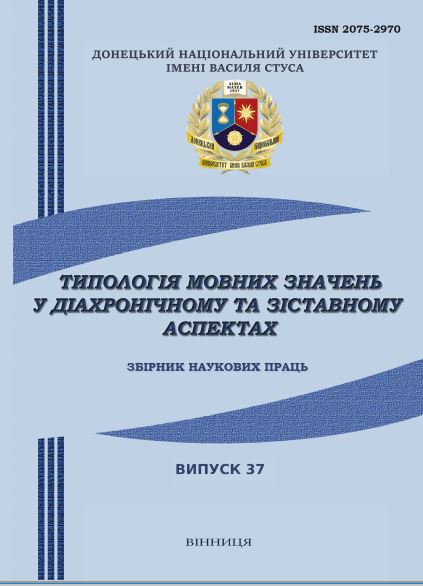Lexical Innovations in the Sphere of Information Technologies in the English Language.
DOI:
https://doi.org/10.31558/2075-2970.2019.37.4Keywords:
neologism, lexico-semantic innovation in the sphere of computer technologies, information revolution, semantic potentialAbstract
The relevance of the work is determined by the lack of a comprehensive analysis of the processes and phenomena occurring in the vocabulary of the English language at the beginning of the twenty-first century. In particular, it becomes necessary to study changes in the ways and means of enriching the vocabulary of the information technology and the Internet, the processes of new derivational elements formation which extensively occur in the last decade. Further complication of the extralinguistic environment requires a sociolinguistic analysis of the innovation processes, the identification of specific social factors which have the greatest influence on these processes, the disclosure of the information revolution role in lexico-semantic changes.
The object of the research are the new lexical units in the computer sphere and the Internet, which appeared in English within the last decade of the beginning of the 21st century.
The subject of the research is the structural and semantic features of the computer neologisms in the English language.
The aim of the study is to analyze the features of the structural-semantic potential in Englishlanguage innovations within the field of information technologies and the Internet. Realization of the goal requires the fulfilment of the following tasks: 1) to find out the main linguistic and extralinguistic factors which determine the innovation processes in the lexical and semantic structure of the English language; 2) to consider existing approaches to the study of the concept ‘neologism’; 3) to analyze the word formation processes of lexical innovations in the sphere of computer technologies and the Internet, to identify the main methods of the word formation; 4) to trace and describe the features of the neologisms’ semantic potential.
The perspective of further research lies in analyzing the ways of transferring English computer neologisms into Ukrainian through various translation methods.
References
Azhnjuk, B. M. (2011). Movni zminy na tli dekolonizaciji ta ghlobalizaciji. Movoznavstvo. № 3. 48–54.
Bybyk, S. P., Sjuta, Gh. M. (2006). Slovnyk inshomovnykh sliv: tlumachennja, slovotvorennja ta slovovzhyvannja. Kharkiv.
Chrichton, M. (2002). Prey. New York.
Iwata, Y., Johnson, K. (2000). Computer Crime Outpacing Cybercops. USA. 13.
Jagudena, A. R. (2013). Sociolingvisticheskij aspekt v izuchenii novoj leksiki. Rostov-na-Donu.
John, A. (2011). The Longman Register of New Words. М.
Kushner, D. (2003). Masters of Doom. New York.
Lewis, B. (2003). The Crisis of Islam. Holy War and Unholy Terro. New York.
Popova, T. V. (2015). Russkaja neologija i neografija. Ekaterinburg.
Skryl'nik, N. A. (2012). Slovoobrazovatel'nye modeli neologizmov v sovremennom anglijskom jazyke. Krivoj Rog.
Zacnyj, Ju. A. (2006). Suchasne anghlomovne suspiljstvo i rozvytok slovnykovogho skladu anghlijsjkoji movy. Zaporizhzhja. Zaporizjkyj nacionaljnyj universytet.

